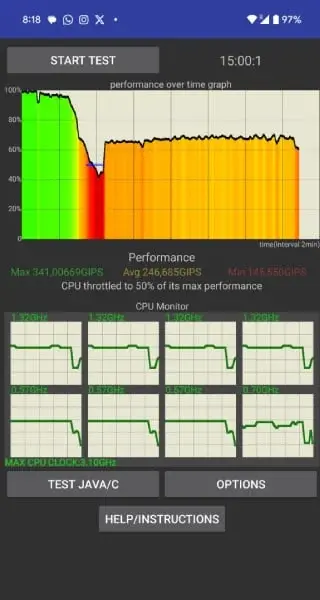Google’s efforts with its custom silicon have consistently faced criticism over issues related to thermal management and sustained performance. Recent reports indicate that the Pixel 9 Pro XL’s Tensor G4 might be particularly vulnerable to these problems.
A user on X, known as @callmeshazzam, revealed alarming results from a CPU throttling test conducted on their pre-ordered Pixel 9 Pro XL. The benchmark indicated that the Tensor G4 could lose up to 50% of its processing capability when under prolonged stress.
Stress Test Observations
The test monitored the frequency of all eight CPU cores within the Tensor G4. After merely three minutes of intense usage, throttling appeared to commence. The performance continued to decline until about four minutes in, with the CPU estimated to have lost nearly 60% of its potential power.
The raw data from the test showed that the Tensor G4 reached a peak of 341 GIPS (giga instructions per second), with an average of 246.6 GIPS. At its most extreme throttling point, the chip reportedly fell to just 145.5 GIPS—only 42.6% of its peak ability. Following this dip, the performance seemed to recover partially, stabilizing at roughly 65% of its maximum capacity.
Performance and Frequency Insights
Examining the frequency chart from the test, the Tensor G4’s performance cores dropped to a low of 1.32 GHz, while the efficiency cores fell to a minimum of 570 MHz. Although Google has not officially disclosed the Tensor G4’s specifications, Geekbench results suggested one core could reach 3.1 GHz, with three cores at 3.6 GHz, and four efficiency cores at 1.95 GHz.
It’s critical to understand that instructions per second (GIPS) isn’t the most thorough performance measure, and stress tests are designed to push devices to their utmost limits. In everyday usage, performance degradation is likely to be less severe. However, these preliminary reports imply that Google may still need to enhance the thermal management of the Tensor G4 in the Pixel 9 Pro XL.



Leave a Reply